Are you using acne cream to treat acne scars, and wondering why you’re not seeing results?
Don’t mistake the two – acne is caused when tiny holes in the skin (known as hair follicles) become blocked.1 Meanwhile, acne scars may happen when acne pores swell and a breakdown occurs in the walls of the pores.2 As the skin repairs itself, acne scars are formed.
Managing – and treating – the two, are very different matters.
Acne is more than “pimples”
A common misconception is that acne reply refers to “pimples”. However, pimples are really just one form of acne, which can show up as:
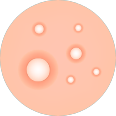
Whiteheads
(closed plugged pores)

Blackheads
(open plugged pores)
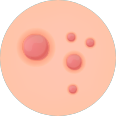
Papules
(small red bumps)
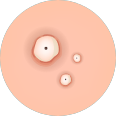
Pustules
(papules with pus, more commonly known as pimples)
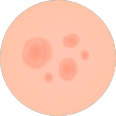
Nodules
(large painful lumps under the skin)
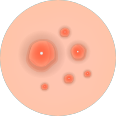
Cystic lesion
(painful, pus-filled lumps under the skin)
Preventing and managing acne
While mild acne can be remedied with over-the-counter medication, treatment of moderate or severe acne may require specialist treatment from a dermatologist.
The good news is that you can gain better control of your acne by taking steps to reduce breakouts. Research has shown that secondary factors, such as diet and stress, can contribute to the severity of acne.3 Other studies have demonstrated links between high-fat (milk and meat) and high-sugar food/beverages with acne4 – so reducing your intake of these foods may lessen your breakouts.
Getting to know acne scars
Acne scars occur as a result of abnormal healing and dermal inflammation5, and are also associated with a darkening of the skin – a condition known as post-inflammatory hyperpigmentation (PIH). While scarring mostly arises from cases of severe acne, scars can occur with any level of severity. In fact, an estimated 95% of acne cases have resulted in acne scars.6
Preventing acne scars
Take these tips to heart to reduce breakouts, and minimise the chances of acne scars appearing:

Don't pop pimples yourself
(leave it to a dermatologist)

Apply sunscreen to protect your skin

Keep your skin moisturised

Treat acne breakouts as
soon as they happen
Treating acne scars
Even with the best precautions, acne scars are a part of life and will happen. They’re certainly nothing to be afraid of, and are easily treatable by a dermatologist or a high-quality topical treatment like Dermatix® Acne Scar, which features a unique blend of active ingredients.
Its innovative CPX Silicone technology endows your skin with extra protection for more conducive scar recovery7, while our ActivGCS formulation (which is created to mimic the healing properties of snail slime) modifies collagen and elastin production for healthier, moisturised skin8 – so dark spots, marks and scars caused by acne can be lightened in as little as 4 weeks.9, 10, 11 Other ingredients like Vitamin B3, Vitamin E and zinc provide all-round holistic scar treatment for your skin.
Stay engaged in the activities you love, with full confidence that acne and acne scars can’t hold you down!






